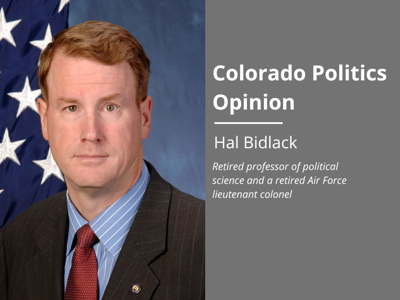
Hal Bidlack
If you’ve glanced at my column from time to time, perhaps as you were wrapping fish, you may well have noticed I find certain sections of Colorado Politics especially rich in stories I want to comment upon. This week is no different, as the most recent Out West Roundup had several stories I want to briefly pontificate about, and one I want to spend a bit more time on.
First up, we learn that in 2023, the most populous county in Arizona, Maricopa County, which is mostly Phoenix, suffered a death toll from extreme heat that was a full 50% higher than the previous year, and is a record that continues to tragically climb each year. And yet I’m guessing there are still quite a few climate change deniers in the GOP down there, including the failed former candidate for governor, now running for the U.S. Senate, Kari Lake. She denies a lot of things, like election results, even after a right-wing organization did a ballot recount that showed President Joe Biden won Arizona by a larger margin than initially reported. She is also a climate change denier, who, when U.S. Sen. Mark Kelly tweeted during a heat wave about the need to explore alternative energies, replied with a lot of snark, stating “We know you are from Texas (where he was an astronaut, for Pete’s sake). But we live in a desert. It gets hot.” Right…
Stay up to speed: Sign up for daily opinion in your inbox Monday-Friday
But I’m not going to talk about that.
I’m also not going to talk about a possible, well, scandal I guess, though that seems a bit harsh. Apparently, the Republican governor of South Dakota, Kristi Noem, decided she needed some dental work done. Apparently, there are no good dentists in South Dakota, because she flew to Texas for some work on her smile. And oddly, she then recorded a five-minute video praising the particular dentist. To lots of folks, that looks like a possible quid pro quo for the dental work, but the governor has refused to comment, nor has the state’s attorney general answered questions about whether she used a state airplane and/or any public funds for the trip. If I were a dentist in South Dakota, I think I’d be insulted.
But I’m not going to talk about that.
What I do want to talk about is another story out of Arizona. It seems a bill has been introduced by Republicans there that the Democratic Gov. Katie Hobbs vetoed. The bill would have, had it become law, made it a crime for noncitizens to enter the state anywhere but in a port of entry. Federal law already makes it a crime to illegally enter the U.S., but like Texas, some folks in Arizona seem intent on creating state law they think might even supersede federal law. There are a variety of other sections of the proposed law, including some that most folks might even agree with, but it is the question of federalism that really shows how dangerous and outrageous such GOP proposals really are.
So please join me in recalling the early years of our nation. Recall please that on Nov. 15, 1777, the Continental Congress, the fledgling national legislature, adopted the Articles of Confederation as the law of our land, with the Articles kicking into effect on March 1, 1781. And please allow me to summarize what happened over the next nine years or so: it was a mess.
Under the Articles, the state governments were supreme, and the national government, such as it was, functioned at the direction of the states. In one of many unfortunate aspects of how the Articles were written, doing anything significant on the national level required a unanimous vote of the 13 new states, or near-unanimity, and there was always a problem.
A certain tiny state.
Rhode Island became known as “Rogue Island,” because that state government, when it bothered to send delegates at all, nearly always voted no on any national provisions like, for example, roads, forts, post offices and such.
In addition, nearly every state printed their own currency, so if you were in, say, New Jersey and you rode your horse into New York, you’d need to swap your state’s money for New York currency. Not exactly a system designed to promote free and fair trade. There were many other problems, far too many to list here, but let’s just say that happily, a personal hero of mine, Alexander Hamilton, got the ball rolling that ultimately resulted in the Constitutional Convention and ultimately, our current form of federalist governance under the Constitution.
Federalism — the core of our system of government — has a relatively simple meaning. Simply put, each layer of government, be it national, state or local, has certain areas of power and responsibilities the other two layers cannot interfere with. So, fixing local roads requires the mayor and city council to get busy, while education tends to be run by the states. And certain very important powers have long been reserved for the federal government. Importantly among these is that only the national government can engage in making defense and foreign policy.
You can imagine the chaos if every U.S. state could negotiate their own trade policies with other nations, setting their own tax rates and importation rules, to say nothing of immigration. You can also imagine the danger if a state (gee, I dunno, let’s say Texas) decided to create its own defense policy. Can you imagine if a state thought it could deploy their national guard to wage war, or other military actions, against other nations or even states?
No, the founders were pretty darn smart, and they were informed by the turmoil of the days of the Articles of Confederation. A federal system is the best way to go, and international issues must be reserved to the national level. Allow a crack in that barrier and you invite havoc.
Now, if the Republicans in the House would just pass the bipartisan borders and immigration bill the Senate passed with 70 votes, we’d be well on the way to a better border situation. But former President Donald Trump issued his orders to his minions in the House to not pass the bill. His order was not issued because he has deeply thought about the legislation and has some additions or corrections. No, he’s against it because it would be yet another thing President Biden got right and did well for the country.
Talk about putting self before service to the nation, geez.
Hal Bidlack is a retired professor of political science and a retired Air Force lieutenant colonel who taught more than 17 years at the U.S. Air Force Academy in Colorado Springs.









(0) comments
Welcome to the discussion.
Log In
Post a comment as Guest
Keep it Clean. Please avoid obscene, vulgar, lewd, racist or sexually-oriented language.
PLEASE TURN OFF YOUR CAPS LOCK.
Don't Threaten. Threats of harming another person will not be tolerated.
Be Truthful. Don't knowingly lie about anyone or anything.
Be Nice. No racism, sexism or any sort of -ism that is degrading to another person.
Be Proactive. Use the 'Report' link on each comment to let us know of abusive posts.
Share with Us. We'd love to hear eyewitness accounts, the history behind an article.